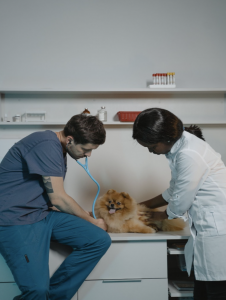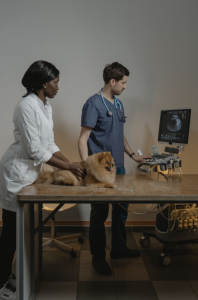What Is The Average Cost Of Starting Your Own Veterinary Practice

Starting a veterinary practice can be costly, and many factors come into play. What type of clinic it will be, where you want to open your practice and what’s required to be fully operational factors into the final cost. Meaning it’s challenging for anyone to figure out exactly what they’ll need before getting started.
That’s why we’ll go over the average cost of starting your own practice and what those costs entail so that you know what ballpark figure you should expect and why!
How Much Should You Expect To Spend?
For an average price of $1,000,000, you’ll be able to open a small animal clinic from the ground up. At $250,000, the cost of starting a mobile veterinary practice is much more affordable.
But what makes up these costs?
The Location of Your Practice Plays a Big Part
Location is also a key factor in the cost of opening a veterinary practice; however, it’s not just how much you spend on real estate. Where you decide to build practice will also determine your utility costs and other expenses that come up.
What Equipment You’ll Require
When establishing your own practice, you can expect to invest in a wide variety of equipment. For instance, veterinary practices need costly instruments for treatments and prevention:
- Scales
- Lighting
- IV Pumps
- Medication
- Anesthesia Machines
- Autoclaves & Sterilizers
- Exam & Procedure Tables
- Tools for physical examination
- Digital X-Ray Imaging Machines
- Supplies for collecting laboratory samples and administering treatments
- And many more options depending on the size of your veterinary practice.
When starting your own practice, expect equipment costs to be a good portion of your overall cost.
Staffing Salaries
Staffing is another significant expense for any veterinary practice. When hiring new employees, you need a plan on how many there will be and their salary levels for the clinic’s operations to run smoothly.
Here’s a list of some average salaries you should expect:
- Veterinary Technician: $36,000
- Veterinary Hospital Manager: $51,000
- Veterinary Assistant: $31,400
- Veterinary Receptionist: $30,000
- You: Dependent on your lifestyle requirements & how much you plan to reinvest into your clinic.
Consider the Needed Permits to Get Up & Running
In the U.S., it is up to each individual state’s discretion on what requirements they want for those wishing to practice as veterinarians. These can range from passing a licensing exam by taking the NAVLE test or getting certifications in specific procedures like surgery.
Basic Insurance Needs
You’ll want to research different insurance policies you’ll require for your practice before opening. There are many options available, but at a minimum, seek a general liability policy (which can cost from a couple hundred to a couple thousand dollars per year) to protect your clinic from potential lawsuits that may occur while you’re treating animals.
Forming Your Business Entity
Registering your veterinary business is another necessary step in starting up. Costs vary based on location and type of business structure, but there are two key steps you’ll need to take for your practice to be recognized as an official company: forming a legal entity (which will vary depending on different states) and registering the business for taxes.
Whatever style of business you decide to register as (e.g., sole proprietorship, general partnership, limited liability company, or corporation), you can find out more on your state’s official website.
Marketing & Advertising Budgets
Veterinary practices should think about their clients and consider that attracting more of them is possible. If you want to hire an agency, be ready for the investment it will take. You can expect 1.2% of your projected gross revenue to be spent on marketing efforts.
Conclusion
Starting your own veterinary practice can be an exciting and rewarding venture, but it is also a big investment. Consider the many factors that come into play when you’re starting out to make sure you are adequately prepared for what lies ahead of you.
If you have any questions or concerns about opening your practice, please reach out! We want all veterinarians pursuing their profession to experience success stories like the veterinarians of the International Veterinary Professionals Association (IVPA).


